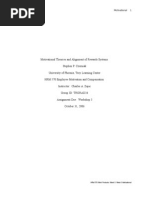Vroom 1964 Expectancy Theory Pdf Merge

• • • Vroom expectancy motivation theory Vroom expectancy motivation theory Whereas Maslow and Herzberg look at the relationship between internal needs and the resulting effort expended to fulfil them, Vroom's expectancy theory separates effort (which arises from motivation), performance, and outcomes. Vroom's expectancy theory assumes that behavior results from conscious choices among alternatives whose purpose it is to maximize pleasure and to minimize pain. Vroom realized that an employee's performance is based on individual factors such as personality, skills, knowledge, experience and abilities. He stated that effort, performance and motivation are linked in a person's motivation. He uses the variables Expectancy, Instrumentality and Valence to account for this. Expectancy is the belief that increased effort will lead to increased performance i.e. Lynda ruby exercise files.
If I work harder then this will be better. This is affected by such things as: • Having the right resources available (e.g. Raw materials, time) • Having the right skills to do the job • Having the necessary support to get the job done (e.g.
Edward E Lawler
Expectancy theory and nascent entrepreneurship. Elements of expectancy theory (Vroom 1964). It predicts that an individual will act in a certain way. Expectancy theory (or expectancy. In 1964, Victor H. Vroom developed the expectancy theory through his study of the motivations behind decision making.
Supervisor support, or correct information on the job) Instrumentality is the belief that if you perform well that a valued outcome will be received. The degree to which a first level outcome will lead to the second level outcome. If I do a good job, there is something in it for me. This is affected by such things as: • Clear understanding of the relationship between performance and outcomes – e.g.
The rules of the reward 'game' • Trust in the people who will take the decisions on who gets what outcome • Transparency of the process that decides who gets what outcome Valence is the importance that the individual places upon the expected outcome. For the valence to be positive, the person must prefer attaining the outcome to not attaining it. For example, if someone is mainly motivated by money, he or she might not value offers of additional time off. The three elements are important behind choosing one element over another because they are clearly defined: effort-performance expectancy (E>P expectancy) and performance-outcome expectancy (P>O expectancy). E>P expectancy: our assessment of the probability that our efforts will lead to the required performance level. P>O expectancy: our assessment of the probability that our successful performance will lead to certain outcomes. Crucially, Vroom's expectancy theory works on perceptions – so even if an employer thinks they have provided everything appropriate for motivation, and even if this works with most people in that organisation, it doesn't mean that someone won't perceive that it doesn't work for them.